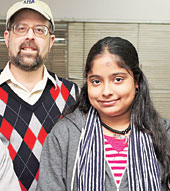 |
| Stephen Shore with Rusha Mukherjee. (Anindya Shankar Ray) |
Rusha Mukherjee has no friends in school. Her classmates often tease her, some call her “dirty”, others even beat her. Her parents are at a loss as schools plead lack of infrastructure to tackle children like Rusha; they worry about her future.
Rusha, who has Asperger syndrome, and her mother shared their story at a round-table meet with autism expert Dr Stephen Shore at the Indian Institute of Cerebral Palsy (IICP) last week.
Shore, himself a highly functional autistic, had words of encouragement for the mother and daughter and invaluable tips for special educators and experts from various institutions.
“My classmates thought I was mad. Some would beat me up. Others considered me dirty. They harassed me so much, that I was glad when my mother changed school,” recalled Rusha. The new school proved no better.
“She should be studying in Class IX. But the two schools where we had put her claimed they didn’t have the infrastructure to cater to students like Rusha. I really don’t know what to do,” said mother Tithi.
Shore stressed the importance of acceptance and appreciation. “A parent has to enter the child’s world and establish a bond. Only by communicating can they help the child. Communicate through simple activities. If a child likes lining blocks, you do the same with him. Be the supplier of blocks. Don’t take them away from him,” said the teacher at Adelphi University, New York. “One child may like blocks, another frogs. Then you have to use frogs to form a bond with him. Enter the child’s world.”
Shore explained how important it is to teach autistic kids to generalise. “A cup presented upside down or in a different colour may not be a cup to the child.”
Calling on parents, kids, teachers and society at large to “work together and build a more sensitive world”, Shore also stressed the benefits of early detection. “Autism in a child can be detected as early as 18 months,” he said.
“Children with autism often suffer in the name of integration. Support and specialised training for teachers are the need of the hour,” said Krishna Roy, the principal of Alokdhara Montessori School for All and one of the participants in the discussion.
As Sudha Kaul, the vice-chairperson of IICP, said parents ought to let go at times, Indrani Basu of Autism Society, West Bengal, and mother of a child with autistic child, voiced the fear of parents. “Many parents are scared how people will react to their child. My son was often beaten up. So we really can’t let go,” she said.
The talks veered towards the future of autistic kids and Shore discussed how to make a special child ready for adulthood. “Disabled adults are the problem. They need to be made more visible,” said Roy.
The other participants included Subhra Chatterjee, the deputy director of IICP, M.B. Chhetri, the deputy director of community-based research at IICP, and Lina Bardhan, the principal of Noble Mission.











